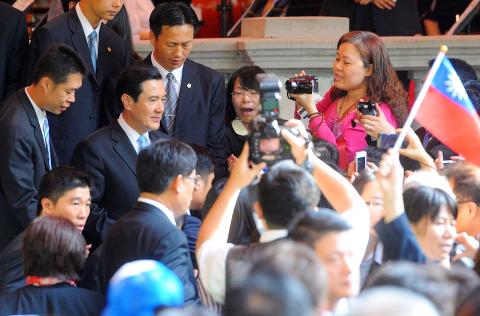|
Ma’s inauguration
sparks interest on Chinese Internet
CAUSING A STIR: Chinese netizens praised Ma for
his ‘one country, two areas’ declaration and supposed frugality, though some
sites later removed their footage
Staff writer, with CNA

President Ma Ying-jeou greets
overseas Taiwanese at a tea party in Taipei yesterday. The event was held to
celebrate Ma’s inauguration by the Overseas Compatriot Affairs Commission.
Photo: Wang Min-wei, Taipei Times
President Ma Ying-jeou’s (馬英九)
inauguration for a second term on Sunday, which was streamed live on the
Internet, created quite a stir among Chinese netizens, with some saying they
support Ma’s description of the cross-strait “status quo” as “one country, two
areas” (一國兩區).
The mainstream media in China gave only limited coverage of the event in Taiwan,
referring to Ma as “the leader of Taiwan authorities.”
However, some Chinese netizens said he should be called what he is — the
president of the Republic of China. In some microblogs on www.people.cn and
Baidu, two major news Web sites in China, it was reported simply that “President
Ma Ying-jeou of the Republic of China has been officially sworn in.”
Some bloggers supported Ma’s statement in his inaugural address that the
Republic of China comprises two areas — “mainland China” and Taiwan. However,
others said they were opposed to the idea.
The majority of Chinese netizens who expressed their views on Ma’s inauguration
said they support his policy of seeking peaceful development of cross-strait
ties based on the so-called “1992 consensus.”
The “1992 consensus” refers to a tacit agreement supposedly reached between
Taipei and Beijing that there is only one China, with each side free to
interpret what “one China” means.
Some Chinese netizens said they hoped to see a “Greater Republic of China” if
China and -Taiwan are united.
Other Chinese netizens complained about “selective” reporting of Ma’s inaugural
speech on some Web sites, urging the editors to “publish the full text [of his
speech] if you have the guts.”
After Chinese media reported that the food and drink at Ma’s inauguration party
cost less than NT$1,600 per person, quite a number of Chinese netizens said they
were surprised at how “frugal” Ma was compared with Chinese officials, who often
go for lavish spreads.
While some Chinese netizens ridiculed Ma, saying he only pretended to be frugal,
others said he had done a good job of exemplifying thriftiness and integrity.
Some used this “shining example” to make sarcastic comments, such as: “Wow,
Taiwan has such a clean and competent leader. Alas, I can see the end of the
days of a certain party [an indirect reference to the Chinese Communist Party].”
Another topic that was hotly discussed among Chinese netizens was a “state seal”
that was handed to Ma.
A Chinese reporter who covered Ma’s inauguration posted this comment: “Who has
ever seen our [Chinese] state seal?”
To which, a response read:, “Could it be that it has sunk in the Yellow River?”
Probably to avoid a repeat of the democracy craze that followed the live
streaming of Ma’s election victory in January, few Chinese Web sites carried
Ma’s swearing-in ceremony or inaugural speech.
Some sites removed footage of the event that had been posted earlier.
For example, on the popular Tudou site, the video on Ma’s -swearing-in was
deleted.
In its place, a notice appeared that said: “The page you are seeking does not
exist.”
|
![]()
![]()
![]()